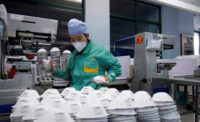How quickly things change. On March 1, I was one of 15,000 people watching the Chicago Cubs play a spring training game at a ballpark in Mesa, AZ. It was warm and sunny, the beer was cold, and I had not a care in the world.
Seventeen days later, there’s no baseball—no sports at all, in fact—no office, no school, no restaurants, no bars, no business meetings, no club meetings, no gym, no theater, no trade shows. I can’t even go to church. Main Street in the city where I live is a ghost town. Can we hit rewind?
Alas, virtually no aspect of life in the United States and the world has been unaffected by the coronavirus pandemic. As of March 18, more than 218,000 cases of COVID-19 have been reported in over 170 countries, with major outbreaks having occurred in mainland China, Europe, Iran, South Korea and the United States. Worldwide, more than 8,900 people have died from the disease, but more than 84,000 have recovered. Here in the U.S., 9,008 cases have been reported, and 150 people have died.
The pandemic has adversely affected U.S. manufacturing in myriad ways. At best, the pandemic has been an inconvenience. Manufacturing and design engineers are working from home, to an extent, but that’s impossible for the folks tasked with actually making stuff. And, whereas suppliers of assembly technology were once happy to bring delegations of customers and potential customers round to their shops, today it’s “essential personnel” only.
At worst, the pandemic has led to part shortages and plant shutdowns. Responding to UAW concerns, General Motors, Ford and Fiat Chrysler will shut down U.S. production through March 30 as they clean and sanitize their factories. Fiat Chrysler has reported that two of its workers have tested positive for the virus. Honda Motor Co. has also agreed to close its doors for six days. (How does one sanitize an assembly plant, anyway?)
In Europe—now the epicenter of the pandemic—the situation is worse. On March 17, Airbus announced that it was temporarily pausing production at its French and Spanish factories for four days to implement “stringent health and safety conditions” and improve “the efficiency of operations under the new working conditions,” according to a press release. The Daimler Group has suspended most production in Europe, as well as work in selected administrative departments, for an initial period of two weeks. Ford, Renault and Volkswagen are doing the same.
There is light at the end of the tunnel. In February, China was overwhelmed by the pandemic, which began in the central Chinese city of Wuhan. Now, with new daily cases in the country dwindling into the single digits, China is helping the rest of the world get the virus under control. Manufacturing is restarting, too. On March 16, for example, Honda partially resumed production of four-wheelers at its assembly plant in Wuhan.
We’ll get through this.



